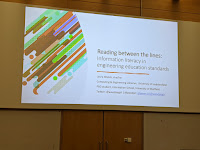Pam McKinney at #LILAC23: this second session is led by a PhD student that Sheila and I supervise, Laura Woods, who is also a subject librarian at University of Huddersfield. Laura is presenting about how IL is represented in engineering education standards, and this is linked to Laura’s PhD topic of the information worlds of women engineering undergraduate students.
In order to understand womens experiences in this area it’s useful to take a step back and look at the overall picture of students experiences in engineering with regards to information. The standards give us a sense of the expectations n this field and the outcomes students are expected to meet. The engineering council accredits engineering degree courses in the UK, and departments have to say how they meet these standards. Also we have standards for IL, the SCONUL 7 Pillars, and the ACRL framework for IL, both widely used in UK universities. The ACRL have a set of documents that are companions to the ACRL IL framework, for specific disciplines, and there is one recently published that is specific to STEM subjects.
Laura has reviewed the literature on the intersection between IL standards and engineering standards, but only one study has previously been published from the context Bradley (2013), who compared accreditation standards from the UK, US, Canada and Australia for nursing, social work and engineering. Much of the language that Bradley found relating to IL in the engineering standards has now been removed, which has made the information skills required for engineers much more opaque. One statement explicitly identifies IL needed “students should be able to select and evaluate technical literature “ but this ignores the activity needed to search for literature. Laura maps these competencies onto the SCONUL 7 pillars model and the ACRL framework. There are partial matches with the competencies in both IL frameworks,
but also competencies that aren’t covered by the engineering standard. 
This was a useful exercise as it is good to understand the competencies that accrediting bodies require from their students and the courses they study. Information use is rarely mentioned, but is present as a hidden first step rather than a skill that students need to develop. There is a lack of recognition that IL needs to be taught and developed, it is seen as something that either they know already or can just “pick up” during their course. So what should librarians do to address this gap in conceptualisation of IL between librarians and academics? Laura’s PhD study should help answer this question! An association of engineering librarians in UK universities could also help.
Photos: Pam McKinney

No comments:
Post a Comment